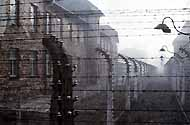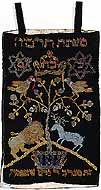
Painting by Bernard (Benjamin) Rolnicki, who perished in the Warsaw ghetto in 1942
Oil on canvas
Demography
Most of the country's Jews live in Warsaw, the capital, but there are also communities in Krakow, Lodz, Szczecin, Gdansk, and in several cities in Upper and Lower Silesia, notably in Katowice and Wroclaw. In the last few years, there has been a reawakening of Jewish consciousness. Young people of Jewish origin who had no Jewish knowledge are joining the community.
 |
| A yeshiva bocher, ca.1930's Painting by Bernard (Benjamin) Rolnicki, who perished in the Warsaw ghetto in 1942 Oil on canvas |
History
Jewish settlements in Poland can be traced back more than 1,000 years. Fleeing persecution in western and central Europe, Jews found sanctuary in Poland. By the middle of the 16th century, about 80% of world Jewry lived on Polish lands. From the 16th to the 18th centuries, Jews enjoyed a unique form of self-government called the Council of Four Lands (Va'ad Arba Aratsot), which functioned as a Jewish parliament. However, from 1648 to 1649, Cossack hordes led by Bogdan Chmielnicki massacred the Jews of eastern Poland (present-day Ukraine). It is estimated that between 100,000 and 200,000 Jews perished. Much of Polish Jewry was impoverished, and Poland became fertile ground for messianic leaders such as Shabbtai Tzvi and Jacob Frank. Later it gave birth to the Chassidic movement.
Toward the end of the 19th century, when much of Poland was a part of anti-Semitic Czarist Russia, a great wave of emigration began, and Polish Jews went to the United States, Canada, Argentina, Germany, France, and the Land of Israel.
In the inter-war period, despite the government's often hostile policies, Polish Jewry represented one of the most creative communities in the Diaspora.
On the eve of the Shoah, 20 years after Poland regained independence, some 3,300,000 Jews lived in the country, constituting the second-largest Jewish community in the world. Warsaw alone had over 300,000 Jews. About 85% of Polish Jewry was wiped out in the Holocaust, and many Jews from other countries were deported to Poland and killed in the German extermination centers situated there.
After the war, most of the survivors refused to return to (or remain in) Poland, which was rocked by civil war and anti-Semitic outrages. Emigration accelerated after the pogrom in Kielce in July 1946, which claimed the lives of over 40 Jews. Although the situation eventually stabilized, the Jewish population continued to shrink through successive waves of emigration.
Community
The Coordinating Committee of Jewish Organizations in the Polish Republic (KKOZRP) coordinates the activities of the various Jewish organizations. The two major communal organizations are the Religious Union of Jewish Communities and the Social and Cultural Organization of Polish Jews-a secular organization. Under the auspices of the Lauder Foundation, clubs have been established that organize a wide range of activities for young people, including Jewish summer camps and athletics. One Jewish group is composed of persons orphaned in the Holocaust and raised by non-Jews.
| Dov Berush Meisels (1798-1870) was a pillar of both Jewish Orthodoxy and Polish patriotism. In 1832 he was elected Chief Rabbi of Krakow (in Austrian-ruled Poland) and he distributed his rabbinical salary to various charitable institutions and the needy. A fervent Polish patriot, Meisels personally financed the purchase of weapons for Polish insurgents battling against Russian rule in the Congress Kingdom. At the same time, he convened prayer services in the main synagogue of Krakow and called upon his congregants to aid the Polish cause. In 1848 he was elected to the Austrian parliament in Vienna and to the Krakow city council. In 1856 he was appointed as Chief Rabbi of Warsaw and actively aided the Polish Uprising in 1863. This resulted in his expulsion from the city. When Meisels was finally allowed to return, he devoted himself to the study of Jewish texts. His funeral in Warsaw in 1870 was attended by thousands of Jews and Poles, and was a great demonstration against the yoke of Russian rule. |
Culture and Education
A Jewish primary school and kindergarten have been opened in Warsaw. The Jewish Historical Institute (ZIH) is an important repository of documentation on the history of Polish Jewry, and especially on the Shoah. It also maintains a permanent exhibition of Jewish art and artifacts from the Holocaust. In Krakow the Center for Jewish Culture in Kazimierz is the venue of much of the city's Jewish activity, including exhibitions, lectures, films, meetings, and various courses.
The E.R. Kaminska Jewish Theater in Warsaw is the only regularly functioning Yiddish theater in the world. Audiences can listen to its productions in Polish (and occasionally in other languages) with the use of headphones. Today most of its actors are non-Jews. There are several Jewish publications including Jidele for young people, Dos Yiddishe Wort (in Polish and Yiddish), a literary journal Midrasz, and the ZIH Bulletin. There is also a journal devoted to Israel called Polska-Izrael. In recent years, there has been an impressive number of books, and publications on Jewish themes have appeared.
Religious Life
There are synagogues in most of the towns mentioned above. Some of these are historic edifices, such as the Remu Synagogue and the Templum in Krakow, and the Nozyk Synagogue in Warsaw. Poland has a chief rabbi whose seat is in Warsaw and a second rabbi who caters to the needs of the youth. The JDC maintains kosher cafeterias in the largest Jewish centers. Private kosher restaurants can be found in Warsaw and Krakow. Kosher meat and other foodstuffs are available, and in recent years, Poland has become an important center for the production of kosher spirits.
Israel
Israel and Poland resumed full diplomatic relations in 1990 after a hiatus of 23 years.
Aliya: Since 1948, 171,471 Polish Jews have emigrated to Israel, 106,414 of them between 1948 and 1951.
 |
| The site of the Auschwitz camp |
 |
| Torah mantle, Galicia, 1870/71 Velvet, embroidered with beads and metallic threads |
Coordinating Committee of
Jewish Organizations in Poland (KKOZRP)
Pl. Grzybowski 12/16 , 00-104 Warszawa
Tel. 48 22 620 0554, Fax. 48 22 620 0559
Embassy
ul. Krzywickiego 24, 02-278 Warszawa
Tel. 48 22 250 923/251 134
Fax. 48 22 251 607